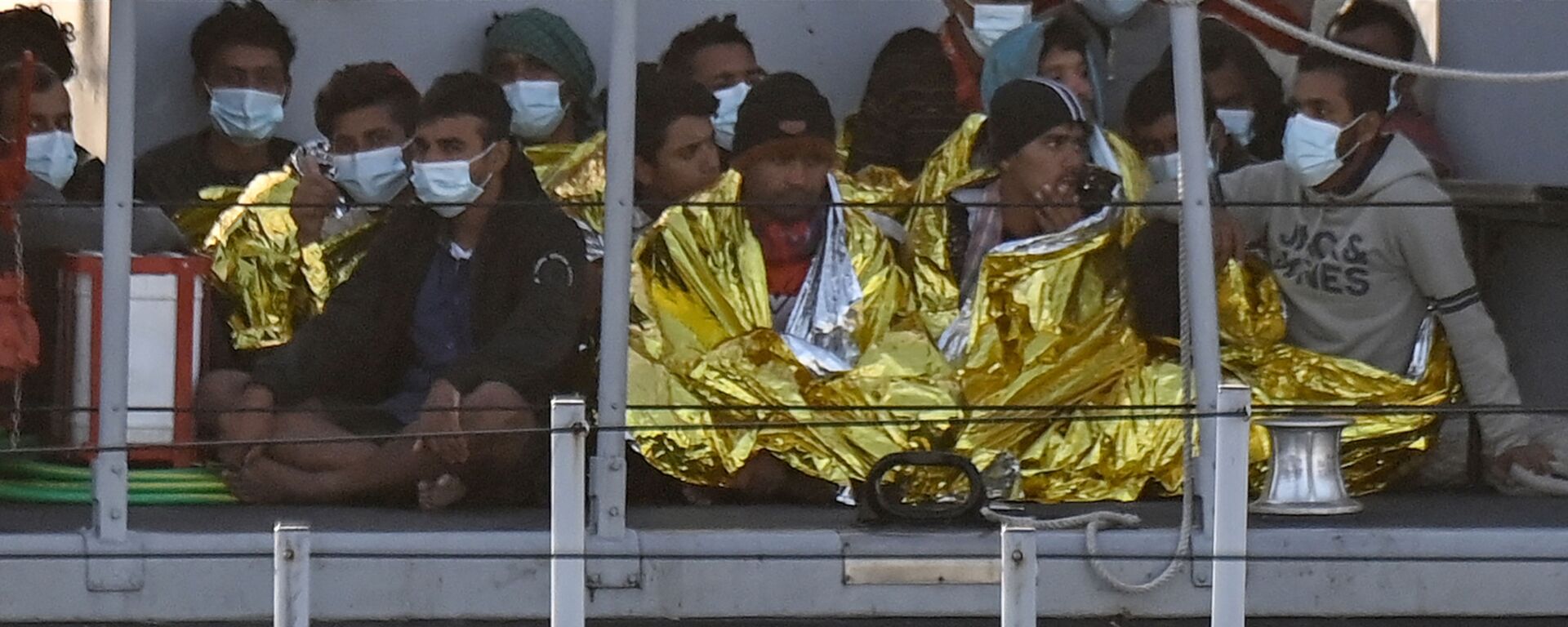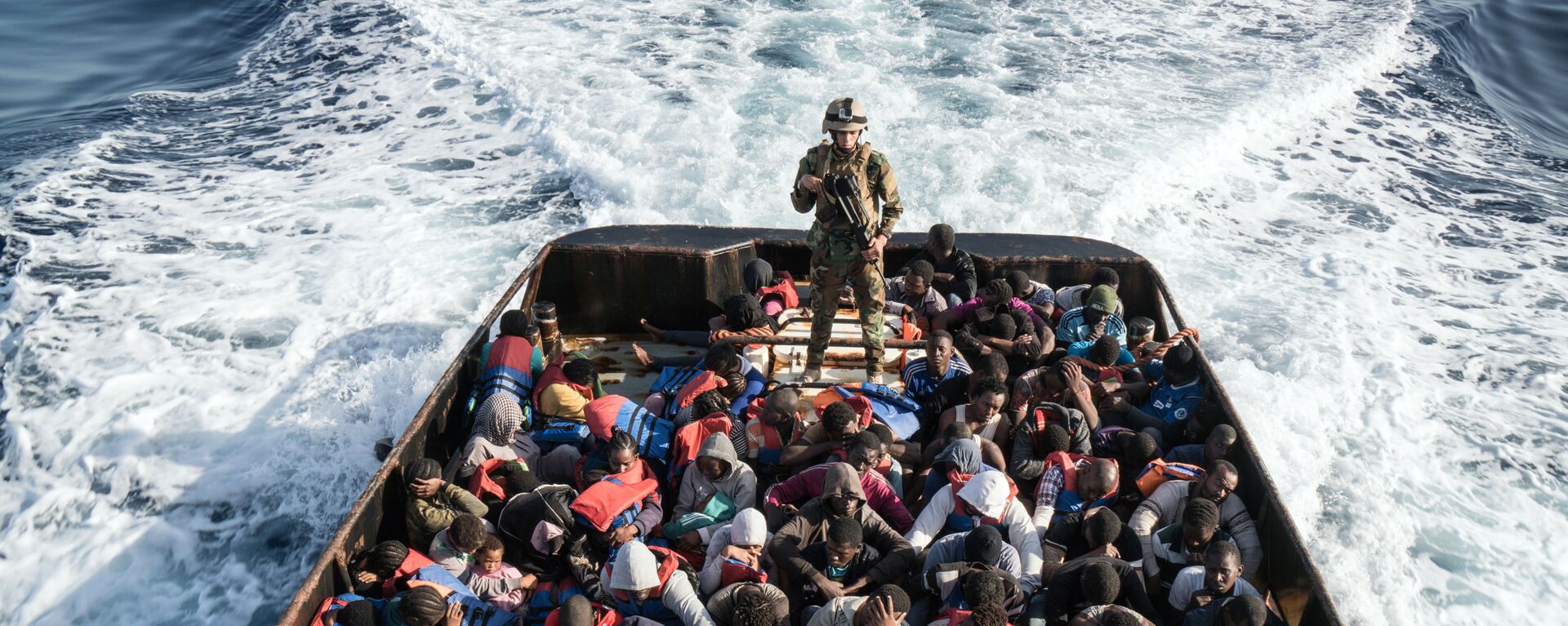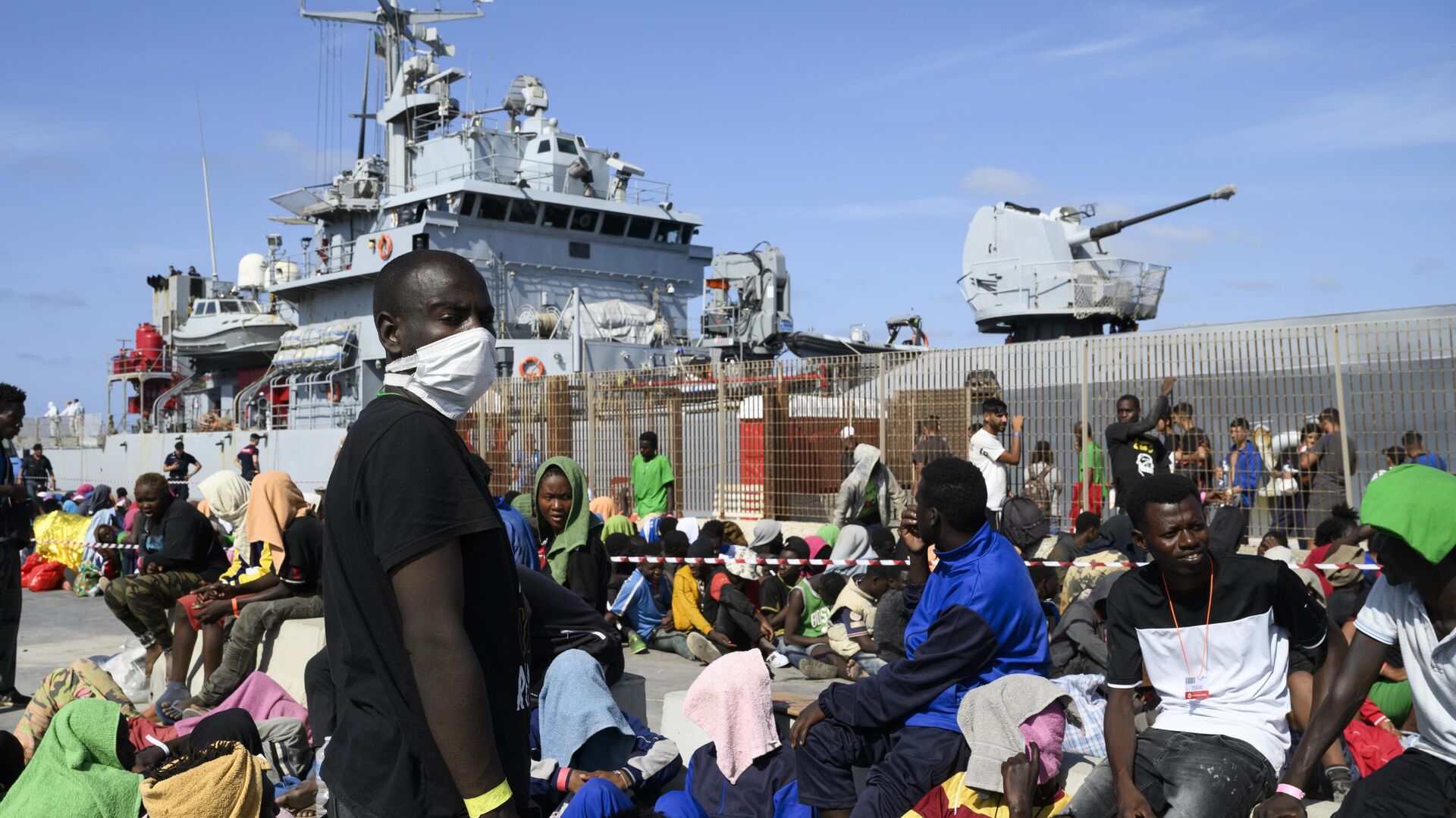https://sputnikglobe.com/20231115/migrant-woes-prompt-germany--italy-to-mull-deal-to-tackle-crisis-1114973928.html
Migrant Woes Prompt Germany & Italy to Mull Deal on Tackling Crisis
Migrant Woes Prompt Germany & Italy to Mull Deal on Tackling Crisis
Sputnik International
German Chancellor Olaf Scholz and Italian Prime Minister Giorgia Meloni reportedly to sign new agreement to tackle migrant crisis.
2023-11-15T13:32+0000
2023-11-15T13:32+0000
2023-11-15T13:40+0000
world
europe
olaf scholz
giorgia meloni
migration
migration policy
social democratic party
italy
germany
https://cdn1.img.sputnikglobe.com/img/07e7/0b/0f/1114971964_0:159:3078:1890_1920x0_80_0_0_e98b4a850261e5bbc8efa03c9c1b068a.jpg
The flaring migration crisis is reportedly prompting German Chancellor Olaf Scholz and Italian Prime Minister Giorgia Meloni to shelve their differences. A new bilateral agreement between the two countries is being touted as a way to tackle the challenge, according to media reports.Scholz, a member of the Social Democratic Party (SPD), and Meloni, who heads the governing Fratelli d'Italia (Brothers of Italy) party, known for its nationalist stance and anti-immigration policies, previously traded barbs over migration policy. Ahead of the European Union summit in Granada, Spain, in October, Meloni had railed against Berlin's plans to finance two migrant NGOs operating in Italy, and suggested that rescued arrivals in the Mediterranean be taken to Germany.However, shared troubles sometimes make for odd bedfellows. Therefore, the two leaders are preparing to sign the new treaty in Berlin on November 22, sources were cited as saying. The said deal will ostensibly be penned as Meloni and her entourage visit Germany for high-level talks.The wording of the agreement is believed to be still a work in progress. However, as per insiders, Germany and Italy may pledge close cooperation on reducing new migrant arrivals utilizing a ‘multi-pronged approach.’Germany and Italy are in the same boat, so to say, when it comes to migration challenges. Arrivals in Germany have surged dramatically, with Scholz ineffectively trying to bring down the number of asylum seekers for months. Over three million refugees, including Ukrainians, are currently living in the country, with many of the overwhelmed municipalities railing against the burdens they face. And yet, Germany is predicted to accept ever more migrants, far surpassing the numbers witnessed back in 2015.Italy, whose island of Lampedusa has been hard-hit by the crisis, is also set to receive the biggest number of migrants since 2016. Italy, which has been seeking a solidarity approach from the EU in solving the migration problem, blamed the flow of undocumented immigrants on the ships of various NGOs, including German ones, involved in rescuing refugees in the sea straits closest to Italy. Besides announcing "extraordinary measures" to deal with an influx of migrants in October, Italy is currently building two new asylum-processing centers on Albanian territory: at the port of Shengjin and the Gjader area in the country's northwest. Italy, which is covering the project's costs, hopes the centers will host around 3,000 people once they open in 2024. Olaf Scholz commented recently that he was looking into Italy's mechanism.It should be noted that many migrants arriving in Italy often proceed to travel further on to Germany. The German Interior Ministry paused acceptance of new migrants who arrived in Europe via Italy in September, citing "high migrant pressure," but then backtracked.After Scholz met with Meloni on the sidelines of the EU summit, he was cited as saying:
https://sputnikglobe.com/20230914/germany-stops-admitting-migrants-from-italy-until-further-notice-1113378275.html
https://sputnikglobe.com/20230916/italian-pm-announces-extraordinary-measures-to-deal-with-migration-crisis-1113417532.html
italy
germany
Sputnik International
feedback@sputniknews.com
+74956456601
MIA „Rossiya Segodnya“
2023
News
en_EN
Sputnik International
feedback@sputniknews.com
+74956456601
MIA „Rossiya Segodnya“
Sputnik International
feedback@sputniknews.com
+74956456601
MIA „Rossiya Segodnya“
europe's migrant crisis, germany's migrant crisis, italy's migrant crisis
europe's migrant crisis, germany's migrant crisis, italy's migrant crisis
Migrant Woes Prompt Germany & Italy to Mull Deal on Tackling Crisis
13:32 GMT 15.11.2023 (Updated: 13:40 GMT 15.11.2023) Both Rome and Berlin are facing particularly serious challenges when it comes to the migrant crisis. Over 145,000 migrants entered Italy this year, which is 52,000 more than in the same period in 2021. Germany, where many states and municipalities are already overwhelmed, is gearing up to receive its greatest number of migrants since 2015.
The flaring
migration crisis is reportedly prompting
German Chancellor Olaf Scholz and
Italian Prime Minister Giorgia Meloni to shelve their differences. A new bilateral agreement between the two countries is being touted as a way to tackle the challenge, according to media reports.
Scholz, a member of the
Social Democratic Party (SPD), and
Meloni, who heads the governing
Fratelli d'Italia (Brothers of Italy) party, known for its nationalist stance and anti-immigration policies, previously traded barbs over migration policy. Ahead of the European Union summit in Granada, Spain, in October, Meloni had railed against Berlin's plans to finance two migrant NGOs operating in Italy, and suggested that rescued arrivals in the Mediterranean be taken to Germany.
However, shared troubles sometimes make for odd bedfellows. Therefore, the two leaders are preparing to sign the new treaty in Berlin on November 22, sources were cited as saying. The said deal will ostensibly be penned as Meloni and her entourage visit Germany for high-level talks.
The wording of the agreement is believed to be still a work in progress. However, as per insiders, Germany and Italy may pledge close cooperation on reducing new migrant arrivals utilizing a ‘multi-pronged approach.’
Germany and Italy are in the same boat, so to say, when it comes to migration challenges.
Europe has faced a refugee crisis since 2015, which has been driven by conflicts in Libya, Syria, Iraq, Sudan, and Nigeria. Most migrants entered the EU via Italy, Greece, and Bulgaria. EU nations agreed voluntarily to accept a certain amount of refugees from the entry-point countries to "share the burden," but this prompted disputes about how many migrants is "too many." The conflict in Ukraine further complicated those debates.
Arrivals in Germany have
surged dramatically, with Scholz ineffectively trying to bring down the number of asylum seekers for months. Over three million refugees, including Ukrainians, are currently living in the country, with many of the overwhelmed municipalities railing against the burdens they face. And yet, Germany is predicted to accept ever more migrants, far surpassing the numbers witnessed back in 2015.
Italy, whose island of
Lampedusa has been hard-hit by the crisis, is also set to receive the biggest number of migrants since 2016.
On September 13, Lampedusa authorities declared a state of emergency after more than 8,000 undocumented migrants arrived on the island in three days, which is more than its permanent population.
Italy, which has been seeking a solidarity approach from the EU in solving the migration problem, blamed the flow of undocumented immigrants on the ships of various NGOs, including German ones, involved in rescuing refugees in the sea straits closest to Italy.

14 September 2023, 18:22 GMT
Besides
announcing "
extraordinary measures" to deal with an influx of migrants in October, Italy is currently building two new
asylum-processing centers on Albanian territory: at the port of Shengjin and the Gjader area in the country's northwest. Italy, which is covering the project's costs, hopes the centers will host around 3,000 people once they open in 2024. Olaf Scholz commented recently that he was looking into Italy's mechanism.
It should be noted that many migrants arriving in Italy often proceed to travel further on to Germany. The German Interior Ministry
paused acceptance of new migrants who arrived in Europe via Italy in September, citing "
high migrant pressure," but then backtracked.
After Scholz met with Meloni on the sidelines of the EU summit, he was cited as saying:
“I think we will succeed in ensuring in a very practical way that we do not work against each other, but with each other.”

16 September 2023, 10:15 GMT




